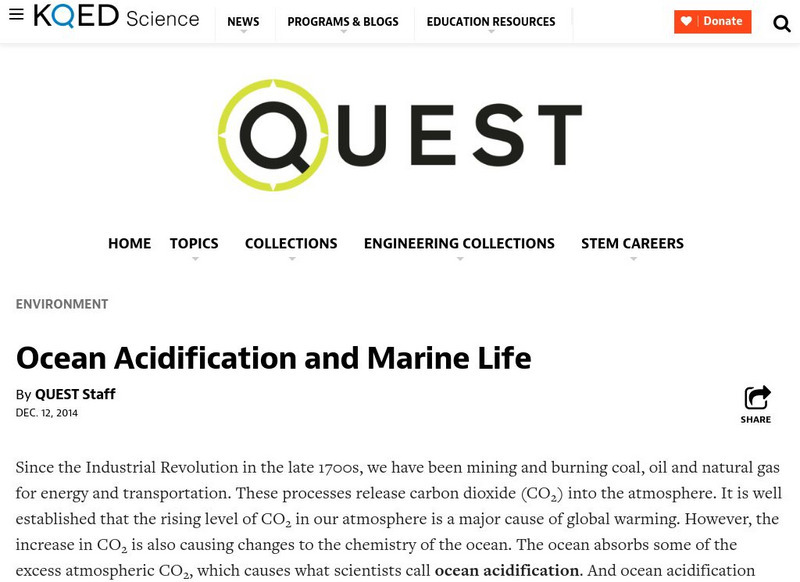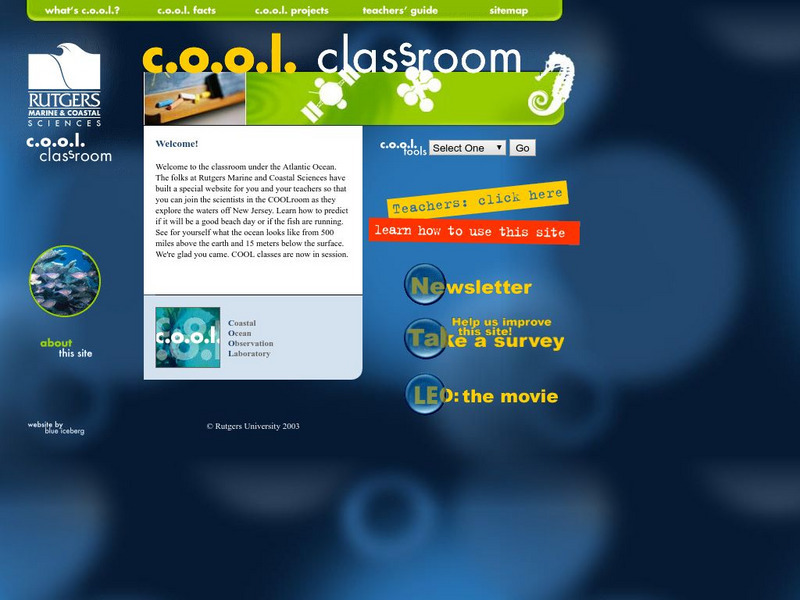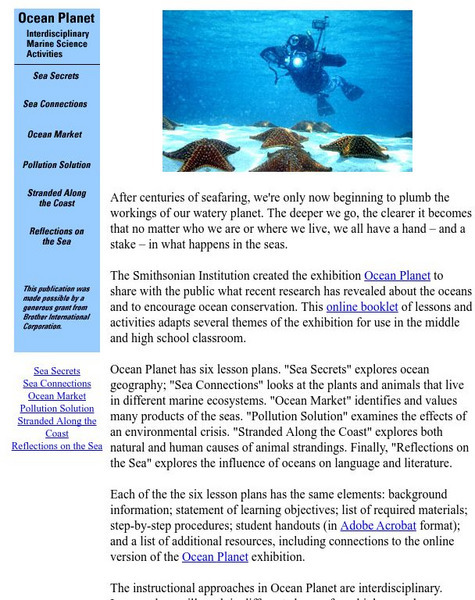Hi, what do you want to do?
NOAA
Noaa: Living Ocean Gallery Invertebrates
Many still photographs and video clips of marine invertebrates are available in this huge collection.
Georgia Department of Education
Ga Virtual Learning: Marine Invertebrates
Students learn about invertebrates found in the ocean, their individual methods of adaptations, identifying characteristics, and contributions to the marine ecosystem.
Georgia Department of Education
Ga Virtual Learning: Marine Vertebrates
Learn about vertebrates found in the ocean, their individual methods of adaptations, identifying characteristics and contributions to the marine ecosystem.
Science Education Resource Center at Carleton College
Serc: Inquiry Into High Resolution Ice Core and Marine Sediment Records
Activity in which questions are provided relating to interpreting paleoclimate data such as characteristics that make sites favorable for paleoclimate records, locating sites using a map, finding patterns and correlations in the data,...
Smithsonian Institution
National Museum of Natural History: Ocean Planet
Detailed website that was a companion to a 1995 traveling exhibit of the Smithsonian. Links to lesson plans and other educational materials are at the bottom of the page. Enter the exhibition to explore the world of the ocean.
Smithsonian Institution
National Museum of Natural History: Ocean Portal, You Navigate
Delight in the fresh colors, sights, and sounds on this dynamic site on the ocean. Major categories consist of Ocean Life & Ecosystems, The Ocean Over Time, Ocean Science, and The Ocean and You. New information on sharks, a slideshow...
PBS
Quest: How Ocean Acidification Affects Shelled Organisms
This step-by-step tutorial walks students through the effects of ocean acidification on some shelled marine organisms.
Other
Rutgers Marine & Coastal Sciences: Cool Classroom
Students and teachers can explore the work of marine scientists and observe the ocean from their computers. Learn about Rutgers Coastal Ocean Observation Laboratory, discover why oceanography is important, and see what life is like in...
Science Buddies
Science Buddies: Swimming in Acid: Understanding Ocean Acidification
The oceans are a precious natural resource, part of Earth's carbon cycle. But what happens if the oceans absorb too much carbon dioxide? Many scientists are concerned that the increased absorption of carbon dioxide is causing them to...
National Geographic
National Geographic: Human Impacts on the World Ocean
In this lesson, students are introduced to the idea that humans have enormous impacts on marine ecosystems and resources, and explore the stakeholders involved.
Science Struck
Science Struck: Facts About the Marine Biome
Describes the characteristics of the marine biome, the plants and animals that live in each of the four ocean zones, coral reefs and estuaries, the climate of the marine biome, and the marine food web.
Wonderville Media
Wonderville: Deep Sea Creatures
We all know that the ocean is home to many beautiful and mysterious creatures. Mysterious cannot begin to describe the fish living in the depths of the ocean. Imagine the kind of creature that lives thousands of feet underwater! Sunlight...
PBS
Pbs.org: Splash & Bubbles: Marine Biology & Social Emotional Learning for Your Classroom
Through play and exploration, Splash and Bubbles demonstrates and celebrates the amazing diversity of life in the ocean, building awareness and appreciation among its young viewers. All the while, viewers are exposed to concepts of...
Read Works
Read Works: Marine Biology
[Free Registration/Login Required] A literary text about a boy named Frank who grew up loving the ocean and has dreams of becoming a marine biologist. A question sheet is available to help students build skills in reading comprehension.
BiologyWise
Biology Wise: Marine Biology Facts
Discusses the unique characteristics of the oceans and the many organisms that live in a marine ecosystem.
Careers New Zealand
Kiwi Careers: Marine Biologist
This KiwiCareers site provides information regarding tasks and duties, working conditions, and other career related information for marine biologists.
The Franklin Institute
Treasures@sea: Exploring the Ocean Through Literature
This extensive resource consists of learning activities that integrate language arts with oceanography. Each activity is based on one of seven books about the ocean and are written to be adaptable. Includes writing activities, games and...
American Museum of Natural History
American Museum of Natural History: O Logy: What's the Big Idea? Marine Biology
An introduction to key concepts about the ocean, its ecosystems, and zones. With interactive flash cards that open in new windows to help you learn more.
Smithsonian Institution
Smithsonian Education: Ocean Planet
A series of lesson plans designed to be used with the Smithsonian Ocean Planet exhibit (available online). Lesson topics include marine ecosystems, pollution of ocean water, animal strandings, and literature.
TED Talks
Ted: Ted Ed: Deep Ocean Mysteries and Wonders
Marine biologist, David Gallo, shows why oceans are important while taking the viewer on a voyage into the ocean and exploring the incredible beauty of marine life. [8:24]
NOAA
Noaa: Pacific Marine Environmental Laboratory: What Is El Nino?
This page tells you what El Nino is, provides links to animations and videos on El Nino, explains how to recognize El Nino, and discusses the history of significant El Nino events.
NOAA
Noaa: Ocean Facts on Marine Fish Habitats
The depletion of marine fish habitats from NOAA affects more than just the fish - it can affect you too! Learn facts about the importance of habitat preservation for science, and for people like you.
Morning Earth
Biosphere as Place: Ocean Benthic Biomes One
Students investigate the Biology topic of ecosystems. The marine ecosystem tutorial consists of definitions, pictures, and examples of different ocean-benthic biomes.
NOAA
Noaa: Pacific Marine Environmental Laboratory: North Pacific Ocean
This site shows a map of the North Pacific Ocean and the surrounding seas. You can study the islands, or the ocean currents in detail.





















